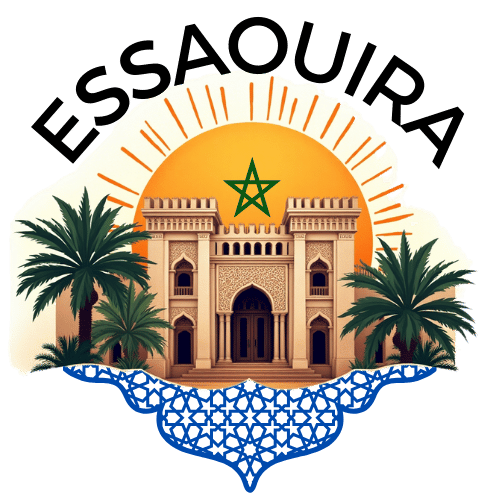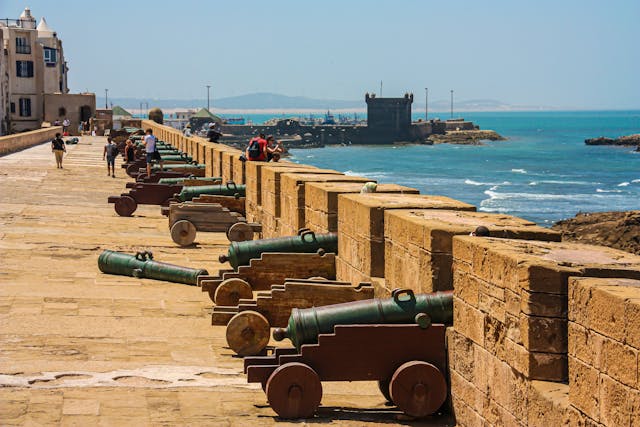Introduction: A Legacy Born from the Sea
Long before Essaouira became the vibrant coastal city we know today, it was known as Mogador, a name that evokes images of ancient trade routes and bustling harbors. The story of Mogador begins with the Phoenicians, one of history’s greatest seafaring civilizations. Around the 7th century BCE, these master traders established Mogador as a key port along their expansive maritime networks.
This article delves into the pivotal role the Phoenicians played in shaping Mogador’s identity, transforming it into a hub of commerce, culture, and connectivity. From its strategic location to its enduring legacy, Mogador’s birth as a trading powerhouse is a tale worth exploring.
1. Who Were the Phoenicians?
The Phoenicians were an ancient civilization renowned for their maritime prowess and entrepreneurial spirit. Originating from modern-day Lebanon, they built a vast network of colonies and trading posts across the Mediterranean and Atlantic.
- Seafaring Experts:
The Phoenicians were among the first to venture beyond the Mediterranean, navigating the treacherous waters of the Atlantic. Their ships carried goods like cedar wood, purple dye, and glassware, establishing trade links with distant lands. - Cultural Innovators:
Beyond trade, the Phoenicians introduced innovations such as the alphabet, which laid the foundation for modern writing systems. Their influence extended far beyond commerce, shaping the cultures of the regions they touched.
2. Why Mogador? The Strategic Importance of Essaouira
A Natural Harbor
One of the key reasons the Phoenicians chose Mogador was its natural harbor, which provided safe anchorage for their ships. Located along Morocco’s Atlantic coast, Mogador offered protection from harsh ocean currents and storms, making it an ideal stopover for long voyages.
- Gateway to Africa:
Mogador served as a bridge between sub-Saharan Africa and the Mediterranean world. Goods like gold, ivory, and spices flowed through its port, enriching both local communities and distant markets. - Defensive Advantage:
The harbor’s location also made it easier to defend against pirates and rival powers, ensuring the safety of valuable cargo.
Crossroads of Cultures
Mogador quickly became a melting pot of cultures, where African, European, and Middle Eastern influences converged. Merchants from Carthage, Greece, and Rome brought new ideas, technologies, and traditions, shaping the region’s identity.
3. The Role of Mogador in Phoenician Trade Networks
Trade Routes Across Continents
Mogador was a vital node in the Phoenicians’ extensive trade networks, connecting three continents:
- Africa: Gold, ivory, and exotic animals from sub-Saharan regions.
- Europe: Metals like tin and copper from Iberia and the British Isles.
- Middle East: Luxurious goods such as textiles, incense, and glassware.
Goods That Shaped Mogador
The goods traded through Mogador reflect its importance in the ancient world:
- Gold and Ivory: These precious commodities were highly sought after by Mediterranean elites.
- Salt and Spices: Essential for preserving food and enhancing flavors, these items were traded extensively.
- Amphorae and Pottery: Used to transport wine, olive oil, and other liquids, these artifacts are still found in archaeological sites today.
4. The Cultural Impact of Phoenician Settlement
A Multicultural Hub
The Phoenicians didn’t just bring goods to Mogador—they brought culture. Their presence introduced new artistic styles, religious practices, and architectural techniques to the region.
- Art and Craftsmanship:
Local artisans adopted Phoenician methods of pottery-making and metalworking, creating unique pieces that blended African and Mediterranean influences. - Language and Writing:
The Phoenician alphabet, a precursor to modern scripts, may have influenced early North African writing systems.
Legacy of Connectivity
Even after the decline of Phoenician power, Mogador continued to thrive as a center of trade and cultural exchange. Its role as a crossroads of civilizations laid the groundwork for Essaouira’s later prominence under Islamic and European rule.
5. Traces of the Phoenicians in Modern-Day Essaouira
While much of Mogador’s ancient past lies buried beneath layers of history, traces of the Phoenicians can still be found in Essaouira today:
Archaeological Discoveries
Excavations around Essaouira have uncovered artifacts like amphorae, coins, and tools, offering glimpses into its Phoenician heritage. These relics are often displayed in museums or preserved at historical sites.
Architectural Remnants
The fortified walls of Essaouira’s Medina and the Skala de la Ville echo the defensive strategies of ancient traders. Though built centuries later, these structures reflect the enduring importance of Mogador as a fortified port.
Living Traditions
The vibrant souks of Essaouira, filled with handmade crafts and spices, continue the tradition of trade that began with the Phoenicians. Visitors can still experience the hustle and bustle of a marketplace that has thrived for millennia.
6. Why the Phoenicians’ Legacy Matters Today
Understanding the role of the Phoenicians in Mogador’s history provides valuable context for exploring Essaouira today. Their contributions shaped not only the city’s economy but also its cultural identity.
- Tourism Appeal:
History enthusiasts flock to Essaouira to walk in the footsteps of ancient traders, marvel at its architecture, and learn about its storied past. - Cultural Pride:
The Phoenician legacy is a source of pride for locals, who celebrate their city’s role as a bridge between worlds. Events like the Gnaoua World Music Festival honor this multicultural heritage, blending African rhythms with Arab and European influences.
Conclusion: A Timeless Connection
The Phoenicians may have sailed away centuries ago, but their impact on Mogador—and later Essaouira—remains indelible. From its strategic harbor to its role as a cultural crossroads, Mogador owes much of its identity to these ancient traders.
As you stroll through Essaouira’s Medina or gaze out at its shimmering coastline, take a moment to appreciate the layers of history that make this city so unique. Whether you’re a history buff or simply curious about the world, Essaouira invites you to uncover the stories of those who came before.
Ready to explore Essaouira’s rich past? Start planning your visit today and discover why Mogador remains one of Morocco’s most captivating destinations.

